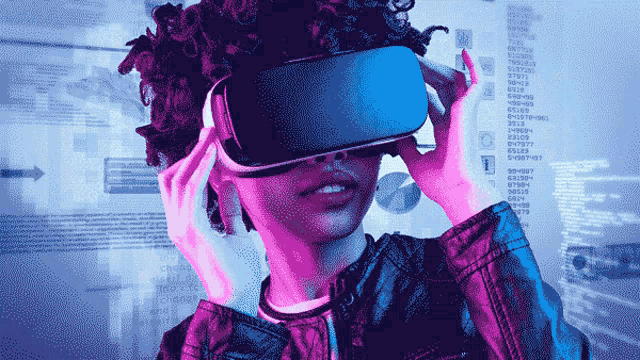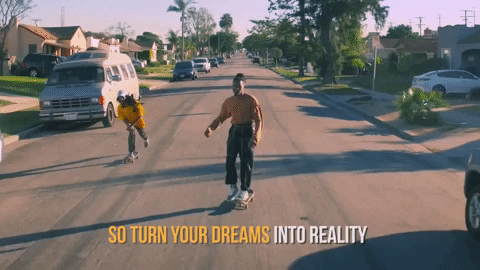👓 VR - The Future of Reality?
Interview with two leading VR/AR experts from vrisch: 5 questions on the state of virtual reality, how it can be used for marketing of brands and the future.
Hello 👋 My name is Florian Schleicher and this is the FutureStrategies newsletter from FutureS. I'm glad you're reading along 💚 If you want to learn strategic marketing, my Simple & Sustainable Marketing Academy is just right for you.
Is this even real?
An idea that a lot of movies, books, and opinion leaders speculate about is maybe not so far off.
As games are gaining more and more attention - both from players as well as from companies who are eying the new market for marketing potentials - we need to understand what really is going on in this field.
That is why I already devoted one posting to an introduction to the market of gaming, the needs of gamers, as well as some first ideas on how companies can integrate it into their marketing.
I also spoke to a gaming studio to understand how games are made.
But today I want to take things even further.
To the brink of reality and our perceptions of it.
I am talking about Virtual Reality (VR) and Augmented Reality (AR).
Because I think there are some significant changes ahead.
“Reality is well on its way to being a dusty old thing of the past, like records and typewriters.”
Chris Dorland, Visual Artist
To understand what those technologies can do and how companies can use them for their marketing impact, I talked to Gabs and Axel (Gabriella Chihan Stanley and Axel Dietrich), who run vrisch - one of the leading VR, AR, and 360 video agencies based in Vienna.
They told me why people are flocking to VR/AR, what needs it addresses, what factors a “good” virtual experience needs, how brands can use it to create impactful marketing, whether VR will replace “normal” reality, and what the future might hold.
I especially love their approach because they start with their audience, as Axel says here:
“When our audience takes off the headset, they have a smile on their face and they can say that they have learned something new and they had fun doing so.”
So let’s dive right into it.
🎙 The interview
Why is there such a big trend for VR at the moment? What needs or problems of people do the technology and experience address?
[Gabs] For me, there are two main reasons why VR has become so popular in the last years: firstly, the acknowledgment of the need for technology that can foster meaningful human connections (we especially learned that during the pandemic!), and secondly, the popularization of the concept of the metaverse. This idea is not new, but it has been brought to the attention of the mainstream public only recently through some big tech companies committing to its development in the coming years.
[Axel] I would add that a huge driver of the field is that the technology has become accessible on a massive scale, both for users and developers. Not just the hardware but also the development environments. Also, contrary to the first hype wave we can now find many more developers offering very specialised applications from non-gaming fields such as healthcare, human resources, education, and many more.
What is important for a good VR experience?
[Axel] A VR experience is good when it achieves what it was designed to do. For us, at vrisch, that means: when our audience takes off the headset, they have a smile on their face and they can say that they have learned something new and they had fun doing so.
[Gabs] What is essential for a good VR experience is that it can act as an enhancement (not a replacement!) of the real world. For instance, a good way to assess whether something makes sense in VR or not is to see if it falls into any of the DIRE categories: Dangerous, Impossible, Remote, or Expensive. If you can physically do something and do the same thing in VR, for me it makes me wonder why we do it in VR in the first place.
What is the biggest challenge when you are working with a brand on its immersive experiences? Can every brand use VR for their brand building and marketing - if so, what is important?
[Gabs] VR has a huge potential to bring us to realities outside our own and give us a peek through these perspectives. I believe that brands can use this power for the greater good, sometimes even making a significant difference in the world. For instance, we worked in the past with the Austrian Armed Forces. You might be thinking “for sure they made a shooter game or similar,” but, aren’t we, in the end, responsible for this content, both as creators and as brands? Don’t we have a chance to influence these actions for the better? We took this chance to do so. We created a VR experience that could filter out potential recruits only interested in making a career out of their Call-of-Duty shooter experience, becoming a danger to themselves and others.
We wanted to start an inner dialog with them; help them understand what it really implies to be part of the Austrian military, in particular, their humanitarian-oriented missions, the responsibility of having lives in your hands. All these aspects are far from just enjoying carrying a weapon. We can’t stop people from joining the military, but we can still be activists for people to join with the right intentions. Why do it in the first place? With or without us, this experience would have happened anyway. I’m happy it landed in our hands.
[Axel] Putting myself into our client’s shoes I think the most difficult part must be finding a partner they can trust. If you want to stand out and build meaningful experiences you have to be willing to innovate and accept the risks that come with innovation: you probably won't get something spectacular if you don't bring a proper budget, and like for all innovation, there is a risk that things might not work out as planned. Except for when you work with us of course ;)
When it comes to the Austrian Army, I believe they were a great fit for VR because the medium outs the audience in the centre of the experience. This setting was very helpful for us to give young recruits a glimpse of the exciting parts of a military career here in Austria.
If you are considering using VR for brand building and marketing there is one main question to answer: what is the added value for using VR? Quick hint: if the only benefit is the “WOW-effect” then that is probably not enough ;)
You are launching a Sherlock Holmes VR game, together with a theatre company - and you also mentioned that you always want to solve problems with your experiences. What problem is this game solving?
[Gabs + Axel] This story game that merges immersive theatre with VR gaming was born during the pandemic. Theatre companies couldn’t perform. Theatre lovers couldn’t go to the theatre. We wanted technology to be the bridge for human connection and facilitate shared experiences, as well as become a revenue source for theatre companies that could allow them to sustain themselves throughout these hard times. This project evolved into creating a genre on its own. A new way to consume stories, both for theatre and games, bringing a new kind of audience to performing arts and to gaming.
[Axel] We are already spending an important part of our daily lives in a metaverse through our smartphones. Something that VR and AR are changing right now is how we interact with this digital parallel world that is heavily intertwined with our physical world.
[Gabs] Good VR doesn’t try to replace the real world. Instead, it enhances it by offering people an opportunity to discover new layers of reality through immersion, play, and unforgettable storytelling. It is not a magical solution and it takes more than the tech to make spectacular experiences. So no, I don’t see us living in the metaverse anytime soon.
3 Last Questions
Finally, here is my quick Q&A with Gabs & Axel:
Which brand has been doing a great job when it comes to VR?
[Gabs] EGLO lamps
[Axel] Bundesforst with the “Haus der Wildnis” - their brand couldn’t be further away from virtual reality, yet they found a perfect use case for it.
A podcast, game, or book that I want to recommend is…
[Gabs] Reality+ from David Chalmers
[Axel] “Voices of VR” a podcast from Kent Bye.
The future of experiences is…
[Gabs] Phygital: Experiences that blend physical and virtual reality.
[Axel] Full-body, multisensory and interactive, because this is how we are meant to experience the world around us.
〜 End of Interview 〜
👀 To the future
Virtual Realities are going to shape our future - no question.
Personally, I am super excited about this new format. I agree with Gabs that we are still a long way from a metaverse emigration and I think that Axel put it greatly by saying that both VR and AR are changing how we will interact with a mixed reality world.
VR is one of the technologies that give me both great hope for a more connected world, while I also remain cautious about how it will affect future generations. Nothing is ever good or bad - we will have to find ways to make meaning of this new chapter of our reality.
This podcast summarises my thoughts very well:
Finally, I very much look forward to playing the new Sherlock VR experience, fully immersing in that reality, and then after experiencing something brand new, taking off my headset with a smile 😊
vrisch is a VR, AR, 360 video agency and production company from Vienna. They develop VR AR software and immersive experiences for innovation leaders. Their tool is Applied Immersive Entertainment.
Are you looking for some more stuff to read?
🤑 Greenwashing in marketing - What it is, why it's bad, and which brands are "greenwashing."
🌍🔜 The future is impact marketing - How will sustainable impact on planet, profit & people shape companies in the future and what is impact marketing?
♻️ Green Marketing - About the responsibility that marketing has for our future
📚 3 books, 2 newsletters, and 1 podcast -Content that inspired me last year
PS: You can also read this posting in German.







